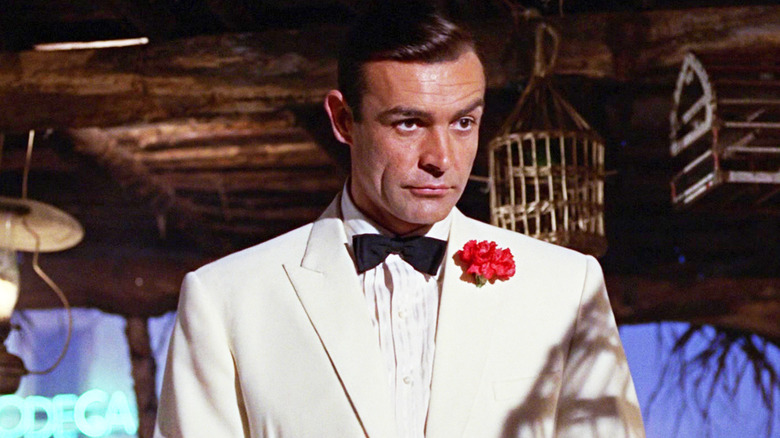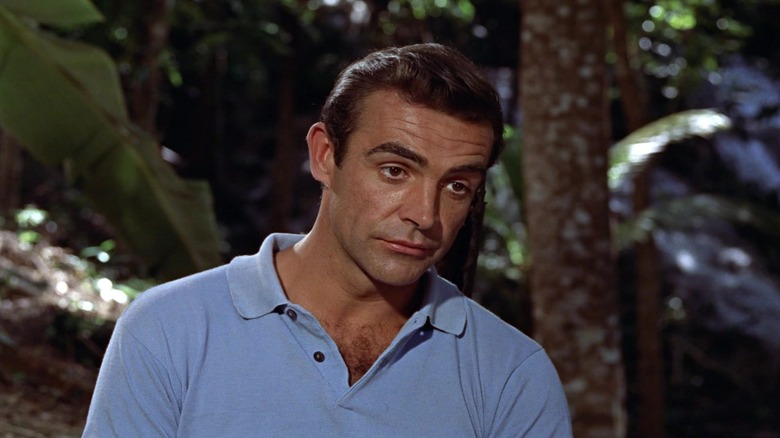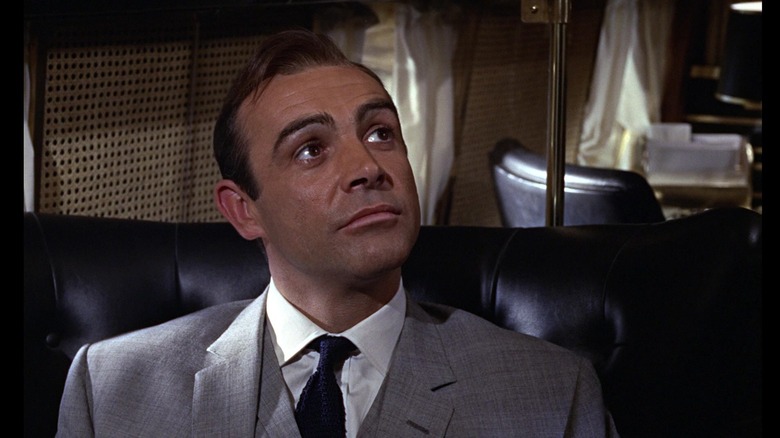Sean Connery Didn't Have A Very High Opinion Of The Literary James Bond
The casual James Bond fan might think that author Ian Fleming invented all of 007's trademarks before his novels were adapted for the screen, but the truth is a lot more complex. One of the biggest influences on the Bond we've all come to know and love was director Terence Young, who oversaw the spy's first big-screen outing in 1962, "Dr. No." Without Young, Bond would have arguably failed. The filmmaker brought his sophistication, fashion sense, and humor to Bond, all of which would come to define the character in the popular consciousness.
Of course, Young undoubtedly benefited from having Sean Connery as his star. Playing James Bond was, however, a double-edged sword for Connery. The actor debuted as England's greatest spy in "Dr. No," but over the course of the next decade would punctuate his tenure as 007 with remarkably nuanced and powerful performances in such classics as 1965's "The Hill" and what Christopher Nolan called his "best performance" in Sidney Lumet's 1973 crime drama "The Offence."
Connery was, after all, remarkably versatile. Having grown up in a working-class family in Fountainbridge, near Edinburgh, the Scot made it a point to become as well-read and erudite as he could in order to increase his range and become as adaptable an actor as possible. That clearly paid off, as the man's filmography shows. Still, the late actor always had a rocky relationship with the role that had launched his career. Bond somewhat overshadowed his impressive abilities, and Connery could feel it, later commenting that he was entirely unprepared for the sheer "scale of reverence and pressure" that came with the role. It also didn't help that he had little respect for the Bond of Fleming's novels.
'I found Fleming more interesting than his writing'
In a 1997 BBC interview, Sean Connery reflected on Ian Fleming as "very bright, very erudite, and a real snob." As a result, Connery felt Fleming's novels missed one key ingredient of James Bond: his humor. Thankfully, a combination of the actor's innate comedic timing and Terence Young's wry sense of humor allowed for the on-screen 007 to become a much more dynamic figure than the hardened spy of the novels. Still, it wasn't enough to make the leading man a fan of Fleming's books.
In Matthew Field and Ajay Chowdhury's 2015 book, "Some Kind of Hero: The Remarkable Story of the James Bond Films," the Bond scholars recall Connery admitting, "[I'd] only read two Bond books [before filming began]. The thing was, I found Fleming much more interesting than his writing." Whatever it was that Connery found so interesting about the writer, it certainly wasn't his sense of humor. As Field and Chowdhury noted, Connery stated:
"James Bond is very much for breaking the rules. He enjoys freedom that the normal person doesn't get. He likes to eat. He likes to drink. He likes his girls. He is rather cruel, sadistic [...] Terence Young, agreed with me that it would be right to give it another flavor, another dimension, by injecting humor, but at the same time to play it absolutely straight and realistically."
For Connery, portraying a humorless assassin-type was of no interest. In a sense, then, the dry wit that's become so synonymous with Bond over the decades, rather than being an essential element of the character since his inception, could be seen as a by-product of Connery's initial reaction to the "snobbishness" he detected in the man who invented 007.
Evolving the character
Since he first debuted in the tux, Sean Connery had a complicated relationship with James Bond. It's become a bit of a tradition for whoever's playing the super spy to be somewhat disdainful of the role, with Pierce Brosnan at one point criticizing the "stupid one-liners," which he evidently "felt phony" delivering. Daniel Craig, meanwhile, got so sick of being Bond he actively encouraged the character's demise in "No Time to Die."
For Connery, the pressure of being at the center of what would become the most enduring franchise in cinema history was almost too much for him to bear. As a result, there were numerous points in his career where he lashed out at the character, at one point saying he'd "like to kill him" (via The Hollywood Reporter). But the fact remains that the Bond franchise has stayed popular throughout its 60-year run, and much of that is down to Connery's efforts to evolve the original character as written by Ian Fleming.
Since then, numerous actors have put their stamp on Bond. Craig arguably delivered a version of the character that undermined Connery's vision, with his steely, brutish 007 from 2006's "Casino Royale" devoid of much of the sly humor that Connery found so integral to his portrayal. In doing so, Craig proved that the character could work as more of a blunt instrument. But that only serves as a reminder that Bond is a diverse and malleable character that lends himself to multiple interpretations.
Let's hope the next interpretation is a slightly less divisive one.


